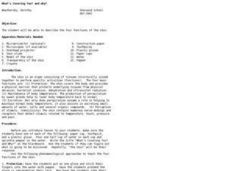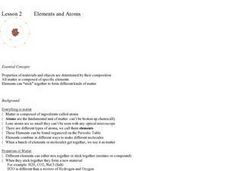Curated OER
Connect the Species
Fourth graders, in pairs, explore energy transfer and species interrelationships by viewing slides on a microscope. hey explore phytoplankton (producers) and zooplankton (consumers)
Curated OER
What's Covering You? and Why?
Young scholars take a closer look at human skin. In this biology lesson plan, students describe the four functions of the skin as they complete a hands-on activity.
Curated OER
Plankton / Phytoplankton
Students discuss the importance of plankton in the ocean ecosystem. In this biology lesson, students identify the different types plankton by observing them under the microscope. They explain how plankton population affect global climate.
Curated OER
Global Change- Earth as Home
Students create their own environment. In this environmental protection instructional activity, students pretend they are the owners of a tropical island. They create jobs for the citizens and develop the island as a model environment.
Curated OER
Endosymbiosis: A Friend Within
Young scholars research the ecological principle of symbiosis. Using a microscope, students observe the relationship of mutualism between termites and flagellates. Young scholars examine a live termite and protozoans. They discuss the...
Curated OER
Amoeba This!!! Amoeba That!!!
Students investigate protozoa. In this protozoa lesson, students identify and classify different types of protozoa using different ecological samples and protozoa charts.
Curated OER
Selling Cells: a Study of Organelles and Cell Structure
Students study cellular structures and functions. For this cell function lesson students participate in a class discussion then make a drawing of the cell they are discussing.
Curated OER
Barnacles: Harder than Cement
Fourth graders watch the movements of the complex animal hidden inside the tiny barnacle shells. This lesson allows students to study the behavior, adaptation, and larval stage of the barnacle.
Curated OER
Elements And Atoms
Students investigate the concept of elements and atoms. They conduct research using a variety of resources and use the information in order to create a class presentation. The lesson includes specific dialogue and steps for the teacher...
Curated OER
What Kind of Insect is That?
Fifth graders characterize insects and classify insects according to the Linnaean system. They use hand lenses or microscopes to examine insect body parts.
Curated OER
Mountain Pine Beetle
Students identify the different parts of a tree. In this biology lesson, students investigate how mountain pine beetles kill trees. They examine the beetles' anatomy using a microscope.
California Academy of Science
Carbon Cycle Role Play
Anytime you make concepts clear with role playing or hands-on experience, it's a win for the whole class. Ping-Pong balls are used to represent carbon in a carbon cycle role-play activity. In small groups, children first discuss what...
Curated OER
Unit: Processing and Manufacturing: Examination Three
StudentsMatch the vocabulary terms in column A with the definitions in column B. Write the letter of the definition in column B in the space next to the terms in column A. Afterwhcich, students Write short answers or fill in the blank to...
Curated OER
Have You Ever Seen a Sea Monkey?
Fourth graders observe brine shrimp over several days. They create drawings showing the growth and development of the shrimp. They research web sites to find out where brine shrimp fit on the food chain and what makes the shrimp unique.
National Nanotechnology Infrastructure Network
Introduction to Nanotechnology Using the Creative Problem-Solving Model
Should we continue to spend money on nanotechnology? Groups engage in a problem-solving unique process around the newly emerging research field of nanotechnology. In order to propose a solution, the groups must research nanotechnology...
Curated OER
Is Your Water Clean?
Students compare water quality of different sources. They test water samples for odor, phosphates, pH, bacteria, and dissolved solids. they fill out a data table and answer questions about their findings.
Curated OER
Where The Blue Fern Grows
Students discuss ancient plants and their adaption in the world. Students review forms of plant propagation. Given proper supplies and directions, students apply a variety of fern spores to peat pellets, monitor the growth, and...
Curated OER
The Grass is Always Greener
Third graders experiment with common grass and cellular division.
Curated OER
Can Bacteria Arise from Non-living Things?
Fourth graders, in groups, determine whether bacteria arises from non-living things,
Curated OER
Crime Scene Investigation (CSI) with Powdery Mildew Fungi
Students explore a specific method of identifying fungi, using a written key and an illustrated key. Powdery mildew fungi can be identified to genus by the morphology (appearance) of the sexual stage (cleistothecia).
Curated OER
Dilution and Concentration of Solutions
Future chemists practice laboratory techniques by creating a monochloramine solution. The objectives are to use of dilution, 9concentration, and measurement skills and to prepare a solution that will be used in a water treatment...
National Institute of Open Schooling
Mole Concept
Learners explore atomic measurement in the first activity in a series of 36. Through readings, activities, and questions, classes review standard SI units, learn about Avogadro's constant, and use it to help them calculate moles. They...
Curated OER
What's That Brown Fuzzy Stuff on My Plum?
Young scholars use Koch's Postulates to determine that a specific organism is the root cause of a specific disease and identify what Koch's Postulates are within a protocol. They describe symptoms and signs of diseased fruit and isolate...
Curated OER
My Favorite Biology Supplies
Here are some biology laboratory supplies that I can't live without.























